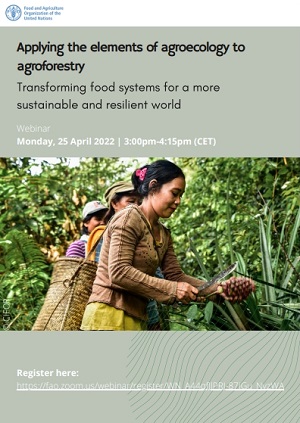The world’s food production and distribution systems are deeply flawed: unsustainable agricultural practices continue to destroy forests, degrade land and intensify climate change, while over two billion people experience some type of malnutrition. The recent Global Assessment Reports by IPCC, UNCCD and IPBES, and the outcomes of the 2021 UN Food Systems Summit draw attention to the call for a transformative change in food systems. However, there is less agreement on how this change should be accomplished considering local and national expectations and aspirations, and global commitments. Recognizing that the inherent complexity in achieving sustainable outcomes is often a deterrent to action, FAO developed the 10 Elements of Agroecology as an analytical framework to support the design of differentiated paths for agriculture and food systems transformation.
This webinar, co-hosted by FAO’s Forestry and Plant Production and Protection Divisions will focus agroforestry and its role in climate change adaptation and mitigation, nutrition security and biodiversity conservation as well as the importance of managing trade-offs and enabling conditions to overcome the main barriers to sustainable implementation and scaling up.






















